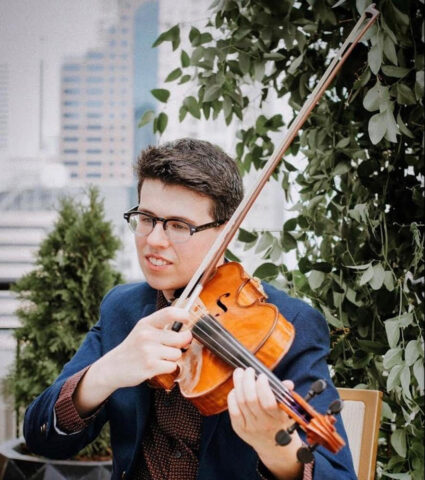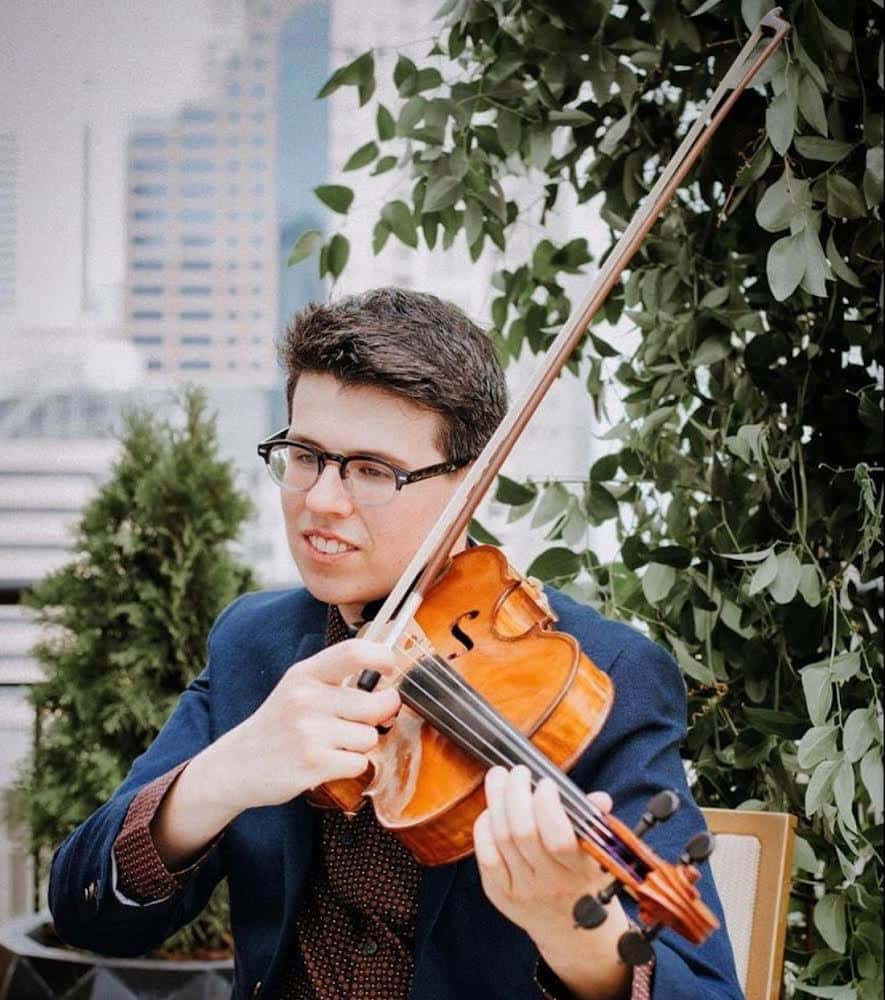 Teachers who understand the unique needs and aspirations of each student and work with them in reaching their goals are the kind of teachers that become part of the success stories of young musicians. Davis King is one such teacher. A graduate of Northwestern University, Davis is currently part of the faculty of the Music Institute of Chicago, and Roosevelt University. He is teaching assistant to Roland and Almita Vamos and is private teacher to several CMPI fellows.
Teachers who understand the unique needs and aspirations of each student and work with them in reaching their goals are the kind of teachers that become part of the success stories of young musicians. Davis King is one such teacher. A graduate of Northwestern University, Davis is currently part of the faculty of the Music Institute of Chicago, and Roosevelt University. He is teaching assistant to Roland and Almita Vamos and is private teacher to several CMPI fellows.
In a recent interview, Davis shared his thoughts on music, teaching, and community — wisdom drawn from his years as a teacher and musician who began at a very young age.
Q: How did you come to do what you are doing now?
A: I began playing at the public school in my hometown of Southampton, New York in kindergarten. A new principal at the school wanted to expand the arts and brought in an incredible educator named Nancy Caine to begin a violin program; in the years since, she has grown the program into one of the best in New York. I remember seeing the violin and having an instant connection — immediately my identity became, “I’m Davis and I play the violin.” It did not come easily; I had some rather serious hearing issues when I was young, so those had to be sorted out before I could make any progress, but I had a feverish love for the violin and classical music in general. Teaching came quite naturally to me. I come from a family of teachers, and many of those in my family who do not teach are involved in the school district in administrative capacities. Surrounded by so many wonderful educators, I think I always assumed I would teach, too. I remember in first grade I “taught” my first lesson to a girl in Kindergarten; we worked on Twinkle. When I was twelve, I began teaching my cousins and some of their friends for five dollars per half hour. In the 17 years since, I have taught pretty much non-stop.
Q: How has your work as teaching assistant to Almita and Roland Vamos influenced your own approach to teaching/music education?
A: Mr. and Mrs. Vamos changed my life. I consider them my two dearest mentors and the best friends I have ever had. The value they place on having a strong musical education really resonated with me; previously I had had some teachers that inspired a love for music but offered little technical advice, and others that (I realize now) really did not care too much about my development as an artist. Mr. and Mrs. Vamos were my first truly well-rounded teachers. Not only are they incredible musicians, but they cared so much for me and my progress, as they do all their students. They showed me that there is no distinction between “technique” and “music” — they go hand in hand. They tailored their work with me towards my goals to teach; as a student at Northwestern I observed hundreds of hours of Mrs. Vamos’ lessons and classes. When I began teaching with them it just felt easy and natural — we have virtually the same priorities in our teaching and music making. Plus, we are all New Yorkers who came to Chicago — I always felt a sense of home with them and that was huge as I established myself in Chicago.
Q: How did you get involved with CMPI? What is it about CMPI’s mission that connected with you, personally and professionally?
A: I first heard about CMPI from a colleague and mentor who is the director of the Negaunee Music Institute at the Chicago Symphony Orchestra. He suggested I connect with Adrienne Thompson and learn about this new program she was building in Chicago. It takes a village to raise young artists so I was immediately intrigued by the community-building I knew CMPI would create. I grew up in a small town where there was not much access to great private string teaching, so I also feel I have an inner mission to connect with students who maybe also have not had access to private instruction.
Q: What do you enjoy most about working with music students in general, and CMPI fellows in particular? What do you find most challenging?
A: The most satisfying part of teaching is when a student can do something they could not do before. These moments really inspire inner confidence and I love seeing that begin to shine through. With CMPI it is especially satisfying as there is a whole team that works with each student that experiences this growth and transformation. The most challenging part of teaching is choosing the right words to use. Language is everything when working with a student, and every student requires a slightly different approach. A few years ago, one of my first students told me how he still thinks about something I said to him 10 years later (I don’t even remember what it was). I learned at that moment how powerful my words are. I am always striving to say as little as possible with the largest effect; every point needs to somehow connect to not only musical and technical growth, but the development of a growth mindset also. On top of this, each statement must be easily digestible by the student.
Q: You have sent several CMPI seniors to some wonderful schools. How did you work with these students to help them succeed in achieving college acceptance?
A: When a new student begins, there is a process of learning one another’s “language” — I must learn not only where they are in their violin journey — repertoire, technical abilities, and performance abilities — but I have to learn their goals and expectations. College is generally one of these goals we discuss. Most importantly, I try to figure out a student’s own perspective of themselves as an artist — all artists deal with insecurity, so I try to figure out how to build a student’s sense of efficacy and self-worth. The student also learns my language — my approach to violin playing and performance, my priorities for their playing, and what I feel are productive goals for us to work towards. Once we are on the same wavelength, we can create goals and systems to achieve our aspirations. Of course, we have systems regarding practice habits and performance, and systems for scheduling lessons with potential professors and follow up emails to maintain this connection. Then we create systems to practice developing performing under the stress of auditions and applications. With good systems in place, college/conservatory acceptance is virtually inevitable.
Q: What do you consider to be the most important advice you could give to aspiring musicians?
A: All artists deal with insecurity. When something goes badly, we feel like we are terrible musicians and when something goes well, we often feel unworthy of our success. I try to encourage young artists to take a more neutral approach to their own playing while also cultivating a strong growth mindset along with a sense of purpose and self-worth. Whether something goes well or not well has nothing to do with our value as a musician or as a person; our value comes from a strong inner sense of having something to share and some idea of where and how we want to share it. It is cliche but every “failure” is really just an opportunity for growth. If we have an inner feeling of purpose, “failure” is just another stepping stone towards that mission.
Davis’ concluding words give a good reminder of the mental framework that every musician would do well to remember. He says, “I truly believe that learning and playing an instrument is quite easy. The difficult part is the time required to do so and the mental obstacles we face and overcome.”
PHOTO: Davis King
Would you like to make a gift to support CMPI?
